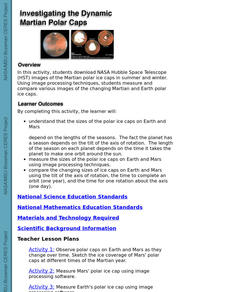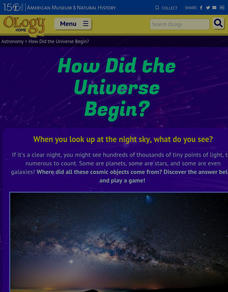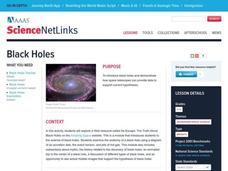Curated OER
Advanced Critical Reading: Hubble
In this critical reading worksheet, students read a passage about the Hubble Telescope and then answer seven questions based on the reading.
Curated OER
Pictures from Hubble Space Telescope
Students observe pictures taken by NASA's Hubble Space Telescope. From a given website, students observe images of the Einstein Cross, Black Eye Galaxy, Hoag's Object, merging and interacting galaxies and more. This lesson plan gives a...
NASA
Space Images
As technology advances, so does our understanding of the universe around us. Thanks to the Hubble Telescope, Mars rovers, and other high-resolution cameras, there are amazing photographs of celestial bodies, planets, comets, and more...
Curated OER
Eye in the Sky
Students use the Internet to broaden their knowledge and understanding of the Hubble Space Telescope by participating in an Internet scavenger hunt, searching for information about the objectives, past successes and repair of the telescope.
Curated OER
Investigating the Dynamic Martian Polar Caps
Students download NASA Hubble Space Telescope images of the Martian polar ice caps in summer and winter, and measure and compare various images of the changing Martian and Earth polar ice caps.
Curated OER
Spacing Out on the Internet
Young scholars explore and locate information about the universe using the Internet.
Curated OER
Algebra: Mirror, Mirror on the Universe
Students assess how algebra, telescopes, space exploration and optics are so important in astronomy. They encounter studies on the Hubble Space Telescope, Hubble Deep Field and how algebra helps to determine the effects of contamination...
Curated OER
A Distant View
Students investigate the essential concepts of how lenses work to magnify vision, and then build simple telescopes to demonstrate their understanding. They write a description of how their telescope could be improved and how it works.
American Museum of Natural History
How Did the Universe Begin?
The Big Bang Theory is more than a television show. Pupils read how Edwin Hubble observed other galaxies and noticed that the galaxies are moving away from each other. Scholars learn about the idea of the big bang and what happened next...
Curated OER
To Boldly Go Where No One Has Gone Before
Students study pictures of space vehicles and make their own space vehicle. In this space vehicle lesson, students study pictures of the vehicles and compare and contrast the pictures. Students classify the space crafts and then create...
NASA
Space-Based Astronomy on the Internet
Young scientists compile everything they have learned into a report in the fifth and final lesson in a unit on the visible light spectrum. Access to photos from observatories, telescopes, and satellites allows learners to compare and...
Curated OER
A Different Kind of Rock Star
Students examine the mysteries of Mars. In this scientific comprehension lesson, students read a USA Today article and discuss questions about Mars. To conclude the lesson, students engage in a Rorshach inspired experiment.
Curated OER
The Relative Sizes of The Sun and Stars
For this relative sizes of the sun and stars worksheet, students determine the relative sizes of the Earth, Jupiter, the Sun and other stars. Students compare the size of stars given ratios of one star to another.
Curated OER
Black Hole...Fade-out!
In this black hole worksheet, students read about how images fade to black when they reach an event horizon of a black hole. Students solve 3 problems about black holes using a given equation for luminosity. They find the time it takes...
Curated OER
Galaxies Galore, Games and More
Students practice skills used in scientific investigation while studying the three main types of galaxies. Students identify Earth as part of Milky Way galaxy, the parts of galaxies, and the types of galaxies, as well as classify...
Curated OER
The Changing Atmosphere of Pluto
In this atmosphere of Pluto activity, students use an equation for the orbit of Pluto to determine the semi-major axis, the semi-minor axis, the ellipticity of the orbit, the aphelion and the perihelion. They also determine the predicted...
Curated OER
Stellar Observations
Ninth graders study the uses of spectroscopy and the operation of the Hubble space telescope. In this astronomy instructional activity students complete a lab activity that includes graphing star color and temperature.
Curated OER
Radiation From Space
In this space worksheet, students will review different aspects of light, sound, and radio waves in space and the use of different types of telescopes. This worksheet has 17 fill in the blank statements.
Curated OER
Telescopes Then And Now
In this telescopes worksheet, students will read information about the differences between the early telescopes and the modern telescopes. Then students will complete 2 short answer questions.
Glynn County School System
Multi-Wavelength Astronomy
Take a look at astronomy through the light lens. From radio to gamma, light waves exist in every corner of the universe. An enlightening PowerPoint presentation gives an overview of the different categories of light and then discusses...
Fluence Learning
Writing About Informational Text: Beyond the Beyond—Galaxies
Everyone has a different point of view, even when it comes to the enormity of the universe. Two separate text passages explain the scope of a galaxy, prompting young readers to write an essay about each author's argument and how the...
Academy of American Poets
Teach This Poem: "In the Next Galaxy" by Ruth Stone
Imagine what life might be like in a different galaxy. That's the challenge young scientists take on in a warm-up activity designed to prepare them for a close reading of Ruth Stone's poem "In the Next Galaxy." After class members share...
Curated OER
Black Holes
High schoolers study black holes and see how space telescopes can provide data to support current hypotheses. They examine the anatomy of a black hole using a diagram of an accretion disk, the event horizon, and jets of hot gas.
National Endowment for the Humanities
Galileo: Revealing the Universe
To gain an understanding of the significance of Galileo Galilei's revolutionary ideas, class members watch the short video "Stargazing Before Galileo," and conduct a close reading of Galileo's Sidereal Messsenger. They then compare...
Other popular searches
- Hubble Telescope Webquest
- Hubble Telescope Web Quest
- Hubble Telescope Activity
- Hubble Telescope Information
- Hubble Telescope Graphs
- Hubble Telescope Lesson Plan
- Hubble Telescope Technology
- Hubble Telescope Deep Space
- Hubble Telescope Hands On
- Hubble Telescope Worksheets
- Hubble Telescope Math

























